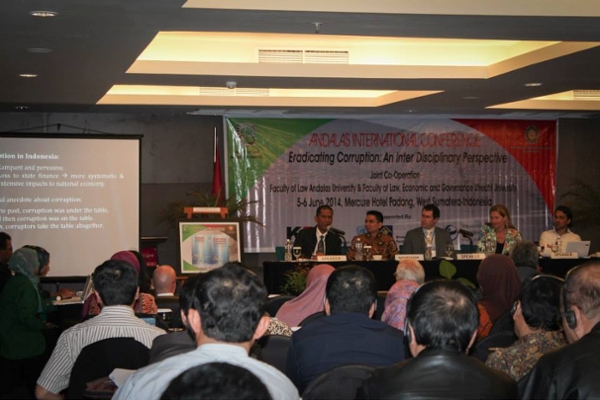Eradicating Corruption
Only a couple of days after the National Conference on Constitutional Law, the Faculty of Law at Andalas University and the Faculty of Law, Economics, and Governance at Utrecht University (located in the Netherlands) held the Andalas International Conference on Eradicating Corruption: An Inter Disciplinary Perspective. The conference was attended by roughly two hundred people from both inside and outside of the country, and it received support from Komisi Pemberantasan Korupsi (the Corruption Eradication Commission, otherwise known as KPK), Kementerian Hukum dan Hak Asasi Manusia (the Ministry of Justice and Human Rights), Transparency International Indonesia (TII), and the United Nations Office on Drugs and Crime (UNODC). The topics focused on the study of corruption faced by the Indonesian people from an economic, social and cultural perspective, as well as a legal perspective. The purpose of the conference was to provide recommendations in an effort to assist in the eradication of corruption in Indonesia.
Because it was an international conference, it was primarily conducted in English (yay!!), and those who could not speak English were able to listen to a translator via a headset. Dr. Bambang Widjojanto, the Deputy Chairman of KPK, had a particularly enthusiastic presentation about KPK’s vision, mission, and strategies. KPK has made a great deal of headway in exposing corrupt officials in every level of government. One of the most current and prominent cases involves former Constitutional Court justice, Akil Mochtar, who is facing graft and money laundering charges. KPK's prosecutors are seeking a life sentence in addition to 10 billion rupiah (about $830,000), and while this seems excessive to me, I have spoken with plenty of Indonesians who believe that the death penalty would be more appropriate. Following a presentation on KPK’s successes, some critics in the audience mentioned that KPK focuses too much on high profile corruption suspects, rather than those in law enforcement (who are generally considered the most corrupt). Other critics (many of whom are in the legislature) of the notoriously aggressive KPK are concerned about its status as a “super-body” and seek to undermine its authority, which currently includes the ability to authorize wiretaps, impose travel bans, access financial information about suspects, and freeze financial transactions.
Some of the other speakers from the first day included Mr. Terry Kinney from the U.S. Department of Justice, who spoke about Rod Blagojevich’s attempt to sell Illinois’ seat in the U.S. Senate that Obama vacated in 2008. By utilizing this example, Mr. Kinney seemed to be expressing solidarity with Indonesia and assuring them that the U.S. is also familiar with corruption. He also explained that, in his experience as a criminal prosecutor in Chicago, corrupt officials are more affected by deprivation of their money rather than an extensive prison sentence. Mr. Mark McCormack, the Attorney General of Australia, spoke about his country’s willingness to work with Indonesia regarding corruption cases, especially since many corrupt Indonesian officials use Australian banks to hide their money. However, Mr. McCormack failed to guarantee that Indonesia could recover the entirety of the corrupt funds once they entered Australian borders. Prof. Tineke Lambooy discussed corrupt practices in the private sector, and how Netherlands-based companies (i.e., Shell, Heineken, etc.) dealt with corruption in Indonesia. She also referenced anti-corruption policies in other countries that Indonesia can use. in order to accelerate corruption eradication. Although I’m sure they were well-intentioned, I felt that the presentations by the foreigners had an imperialistic flavor to them, and I wonder if the Indonesian conference participants felt the same way.
